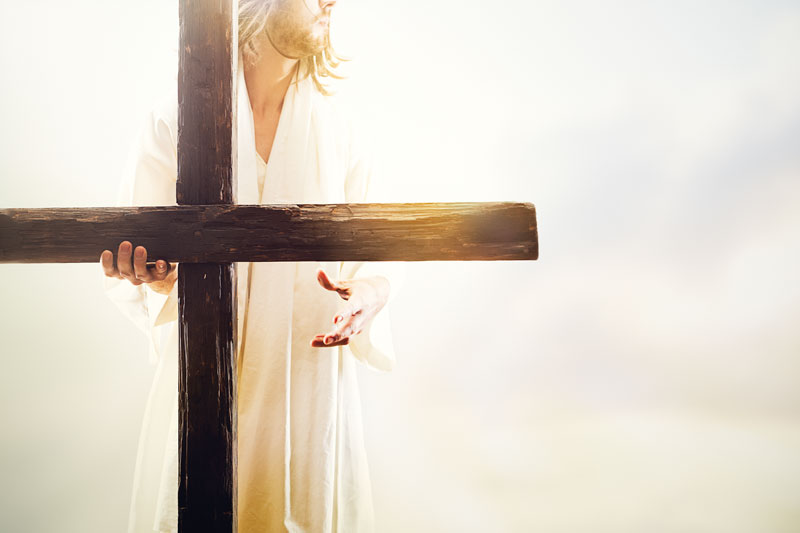What causes you to be afraid? Is it the dark? Spiders? Illness, heights, confined spaces, money problems or the future? A myriad of things are understandable causes of fear, and often that fear is accompanied by anxiety. There is a recurring theme throughout Scripture where God tells us not to be afraid.
At Christmas we noted the words from the angel Gabriel to Mary as she was told she would be the mother of Jesus: “Do not be afraid” (Luke 1:30). Remember that according to the Bible, angels are not quite the same as the helpless, beatific, tinsel-adorned young girls and boys who portray them in nativity plays—Psalm 103:20 describes them as “mighty.” The shepherds were comforted by the same phrase with the appearance of an angelic host (see Luke 2:10). In Matthew’s account of the Resurrection morning, the first words of the angel at the tomb are: “Do not be afraid” (28:5). Just a few verses later, the women meet Jesus and his first words are: “Do not be afraid” (v 10).
The Old Testament addresses the same issue as Joshua is about to succeed Moses. We read Moses’ encouraging words in Deuteronomy 31:8: “The Lord himself goes before you and will be with you; he will never leave you nor forsake you. Do not be afraid; do not be discouraged.” There is also the promise from God in Isaiah 43:1: “Do not fear, for I have redeemed you; I have summoned you by name; you are mine.” And at the end of the New Testament, as John sees Jesus in his vision and falls at his feet, Jesus again says: “Do not be afraid” (Revelation 1:17).
So we see that throughout Scripture God says to us: “Do not be afraid.” In the life of Christ, even from the foretelling of his birth, to the announcement of the same, to that first Easter morning, we hear those same words: “Do not be afraid.” It seems clear to me that God is inviting us to move from a place of fear to a position where we implicitly trust this “immeasurably more” God who never fails.
These words from God are not just trite advice. For those who know God and share life with him, there is no need to be afraid because God has overcome the world (see John 16:33), defeated sin on the cross and conquered death—as revealed by the empty tomb! We need to remember this when fear takes hold of us.
God is not a distant, powerful deity; he is an ever-present God who seeks to live with and in his people. We need to couple the instruction of “Do not be afraid” with the recurring promise we read before: “I will never leave you nor forsake you.” When fear takes hold, we should remember not only the omnipotence—all-powerfulness—of God; we should remember that he is right with us, beside us and in us. God’s perfect love “drives out fear” (1 John 4:18).
What is happening in your world and in your life this Easter?
Anyone who is struggling with sin and recurring cycles of behaviour that they feel unable to break can choose not to be afraid, but to trust in the God who broke the power of sin on the cross. Anyone who is facing significant challenges in life within the family, at work or with health, for example, can choose not to be afraid, but to trust in the God for whom nothing is impossible. Anyone who is experiencing grief and loss can choose not to be afraid, but to trust in the God who conquered death and promises eternal life.
So, this Eastertide, do not be afraid. Remember—God is with you. Do not be afraid. Remember—God is bigger than the situation you are facing. Do not be afraid. Our God is victorious, and he invites us to share in his victory!
General Brian Peddle is the international leader of The Salvation Army.
Photo: © RyanJLane/iStock.com
At Christmas we noted the words from the angel Gabriel to Mary as she was told she would be the mother of Jesus: “Do not be afraid” (Luke 1:30). Remember that according to the Bible, angels are not quite the same as the helpless, beatific, tinsel-adorned young girls and boys who portray them in nativity plays—Psalm 103:20 describes them as “mighty.” The shepherds were comforted by the same phrase with the appearance of an angelic host (see Luke 2:10). In Matthew’s account of the Resurrection morning, the first words of the angel at the tomb are: “Do not be afraid” (28:5). Just a few verses later, the women meet Jesus and his first words are: “Do not be afraid” (v 10).
The Old Testament addresses the same issue as Joshua is about to succeed Moses. We read Moses’ encouraging words in Deuteronomy 31:8: “The Lord himself goes before you and will be with you; he will never leave you nor forsake you. Do not be afraid; do not be discouraged.” There is also the promise from God in Isaiah 43:1: “Do not fear, for I have redeemed you; I have summoned you by name; you are mine.” And at the end of the New Testament, as John sees Jesus in his vision and falls at his feet, Jesus again says: “Do not be afraid” (Revelation 1:17).
So we see that throughout Scripture God says to us: “Do not be afraid.” In the life of Christ, even from the foretelling of his birth, to the announcement of the same, to that first Easter morning, we hear those same words: “Do not be afraid.” It seems clear to me that God is inviting us to move from a place of fear to a position where we implicitly trust this “immeasurably more” God who never fails.
These words from God are not just trite advice. For those who know God and share life with him, there is no need to be afraid because God has overcome the world (see John 16:33), defeated sin on the cross and conquered death—as revealed by the empty tomb! We need to remember this when fear takes hold of us.
God is not a distant, powerful deity; he is an ever-present God who seeks to live with and in his people. We need to couple the instruction of “Do not be afraid” with the recurring promise we read before: “I will never leave you nor forsake you.” When fear takes hold, we should remember not only the omnipotence—all-powerfulness—of God; we should remember that he is right with us, beside us and in us. God’s perfect love “drives out fear” (1 John 4:18).
What is happening in your world and in your life this Easter?
Anyone who is struggling with sin and recurring cycles of behaviour that they feel unable to break can choose not to be afraid, but to trust in the God who broke the power of sin on the cross. Anyone who is facing significant challenges in life within the family, at work or with health, for example, can choose not to be afraid, but to trust in the God for whom nothing is impossible. Anyone who is experiencing grief and loss can choose not to be afraid, but to trust in the God who conquered death and promises eternal life.
So, this Eastertide, do not be afraid. Remember—God is with you. Do not be afraid. Remember—God is bigger than the situation you are facing. Do not be afraid. Our God is victorious, and he invites us to share in his victory!
General Brian Peddle is the international leader of The Salvation Army.
Photo: © RyanJLane/iStock.com










Leave a Comment